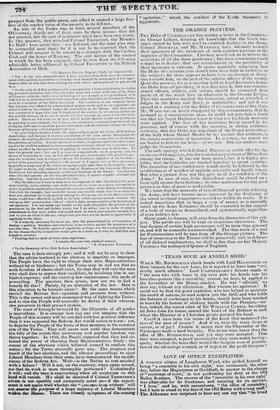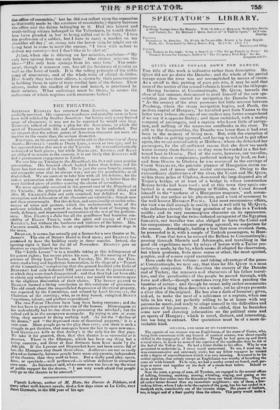LOVE OF OFFICE EXEMPLIFIED.
A WORTHY citizen of Langbourn Ward, who prided himself on being "a constable in his own right," was summoned, the other day, before the Magistrates at Guildhall, to answer to the charge of "contempt of court," in nut performing his duty at the Old Bailey Sessions. The answer of the "constable in his own right was admitable for its frankness, and amusing for its naiveté. " I love," said he, with earnestness, "the office of constable3 but I hate to stand at the door of the Old Bailey with along staff. The Alderman was surprised to hear any one say that "he loved the-office of constable;" but be did nut reflect upon the separation so 'distinctly made by the amateur of constabulaiy dignity between the office and the duties belonging to it. Had this honest and truth-telling citizen belonged to the Volunteers, he would doubtless have pleaded in bar to being called out to do duty, "1 love the profession of a soldier, but I hate to carry a musket on my shoulder all day ;" or, rising into the heroic vein, he might say on being beat to aims to meet the enemy, "I burn with ardour to defend my country—but I don't like to Iss shot at."
Juliet, when she is dilating on her miseries, exclaims—" My only love sprung from my only bate." Our citizen rem ses the idea—" His only hate springs from his oniy love." . The sentiment, though a common one, has all die freshness of novelty as eell as the force of truth. It is the ruling principle of the noble army of sineeurists, and of the whole tribe of official de-littles. How dearly they love their offices, is shown by their perseveiance in holding them in spite of their cordial hate of the duties. Their silence, under the conflict of love and hatred, is purchased by their salaries. What sufferings must be theirs, to secure the endurance of which requires such enormous bribes!



























 Previous page
Previous page